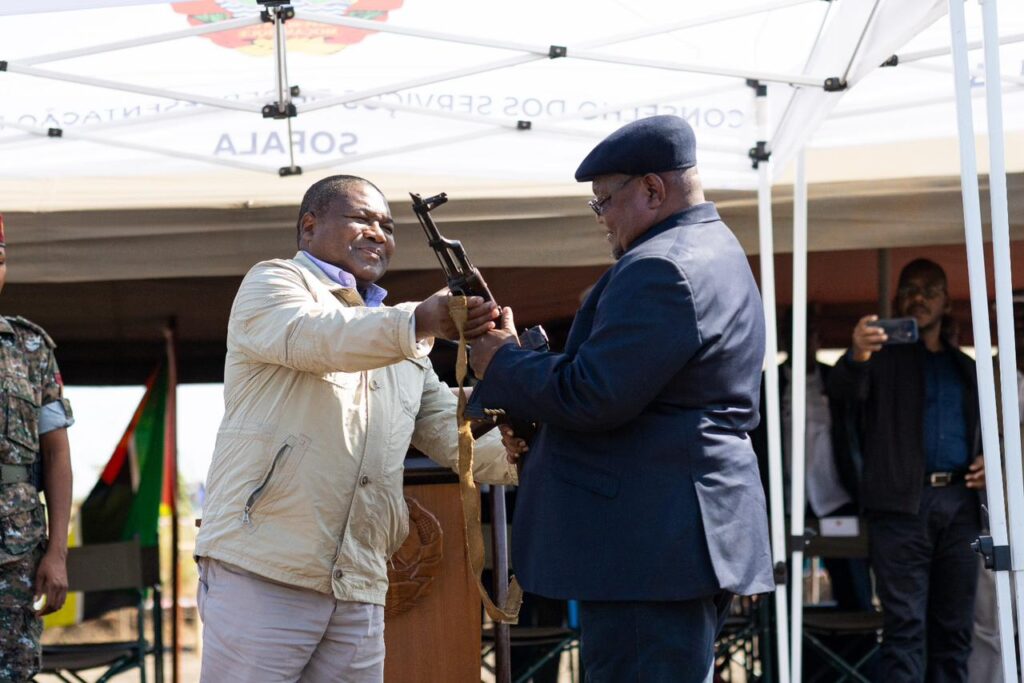ADF STAFF
Joyous singing and dancing punctuated a June 23 ceremony in Maputo to celebrate the end of a dark era in Mozambique’s history. Dancers symbolically exchanged wooden props, replacing assault rifles with shovels and hoes.
Mozambican President Filipe Nyusi and Ossufo Momade, leader of the Mozambican National Resistance (RENAMO), radiated pride during a gathering that recognized the rebel group’s transition to a political party.
“With this process, the country has won credibility as an example of how to lead peace processes,” Nyusi said.
In another ceremony eight days before, the two men smiled broadly and embraced in Vanduzi at RENAMO’s last base, with the picturesque Gorongosa mountains looming in the background.
Momade handed Nyusi an AK-47 that he said was RENAMO’s final weapon. The ceremony marked the dismantling and closure of the last of RENAMO’s 16 military bases.
Also during the June 15 ceremony, 347 RENAMO troops joined a disarmament, demobilization and reintegration (DDR) process that has seen a total of 5,221 former RENAMO fighters demobilized since 2019.
Nyusi spoke directly to the RENAMO men, expressing hope that the base closure will put an end to violence related to political differences and an end to a bloody chapter of armed attacks in Mozambique’s central provinces.
In the aftermath of Mozambique’s independence, RENAMO emerged in 1977 as an anti-communist militant group opposed to the country’s ruling Mozambique Liberation Front, known as the FRELIMO party, and its attempts to establish a one-party state.
The two sides fought in the Mozambican Civil War from 1977 to 1992, when a peace accord led to RENAMO’s disarmament and the integration of some of its fighters into the Mozambican Army.
But tensions reignited in 2013 with a RENAMO splinter group’s campaign of guerilla warfare. As many as 12,000 Mozambicans fled the country as a result of the insurgency in the first three years of fighting, according to the United Nations.
On August 1, 2019, Nyusi and Momade signed a peace agreement that brought an end to six years of fighting.
Because the disarmament and demobilization process is complete, Nyusi said on June 23 that the next step is reintegrating the former rebels into Mozambican society.
“We know that we still have a long path ahead of us,” he said. “Reintegration and reconciliation will require the contribution of everyone. We Mozambicans must tread this path. Peace is not a finished product; it is a continual process.”
Mozambique’s successful peace process earned an international chorus of plaudits.
“The world is in crisis,” said Cristina Duarte, special advisor on Africa to U.N. Secretary-General António Guterres, during the June 23 ceremony. “In the face of this gloomy scenario, Mozambique’s political dialogue for peace has become a ray of hope.
“Mozambique has demonstrated that conflicts can be resolved peacefully, through honest, open and politically inclusive dialogue.”
African Union Commission Chairperson Moussa Faki Mahamat issued a statement saying that the final RENAMO base closure was a “tremendous contribution towards silencing the guns in Africa.”
Mirko Manzoni, Guterres’ personal envoy for Mozambique, praised Mozambique’s DDR process for its “human-centric approach.”
“The world needs African leaders to demonstrate how peace can be forged and how it can be promoted,” he said on June 23. “Mozambique has demonstrated itself to be a leader, and I am confident that the country will continue to be one, inspiring others to do the same.”

